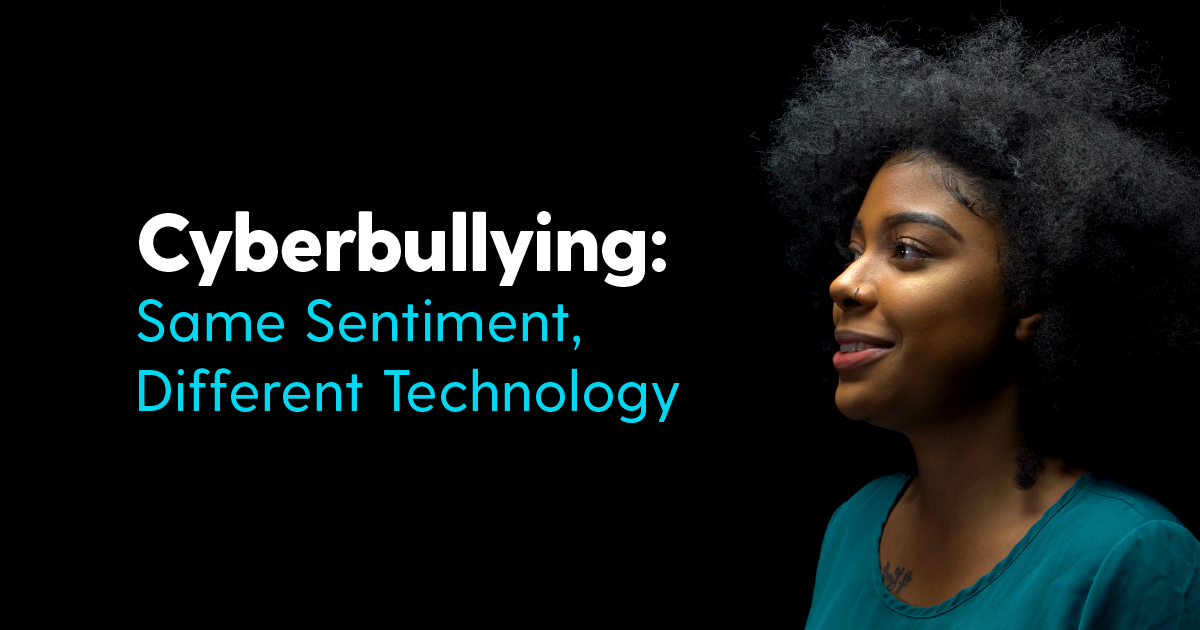
October is National Bullying Prevention Month, and for kids today, one of the most common forms of bullying they'll be exposed to is cyberbullying. At Bark, we know firsthand how damaging cyberbullying can be to a child's psyche, which is why we're passionate about teaching parents and kids what cyberbullying looks like and how to prevent it.
In this video, "Cyberbullying: Same Sentiment, Different Technology," Bark employees share their own bullying stories. And discuss the proliferation of cyberbullying in modern society, what has (and hasn't) changed about bullying over the past 25 years, and how to recognize the signs of cyberbullying in children.
Bullying stories video transcript
We founded Bark in 2015 as a way to keep kids safer on internet-connected devices. As a parent I’m all too aware of issues like cyberbullying. Over the years, we’ve seen firsthand the effects of kids being bullied online.
Bullying has always been a problem. It’s even worse now with the proliferation of technology.
I joined Bark because I wanted to keep kids safe. Every day we see new instances of threats like cyberbullying, and it’s only getting worse.
Cyberbullying is an issue that’s not going away, and that’s why we wanted to share our own stories of how we were bullied.
I was sitting at a school rally and the girl sitting behind me put little wads of gum in my hair. And it really made feel like the scum of the earth. Things like that happened all the time, just because I was different.
Growing up in a predominantly white community as a mixed race immigrant, I was presented with some challenges. I was called rice picker. Jokes on them — rice is delicious.
When I was in third grade, I was called "gorilla girl" because my arms were crazy hairy, and it was not blonde. So now, i shave my arms, so I don't get called that anymore.
When I was in eighth grade, a group of girls I thought were my friends started to bully me. They spread rumors about me in school and tried to get me in trouble with the school administration. They even had this notebook — it was a red Hello Kitty notebook — that they would write mean things about me in, and they encouraged other people to write mean things, too. It really made me feel isolated. I stopped feeling like a person and started to feel just like an object.
I say this to parents all the time when I’m talking to them: if technology existed the way it does now when I was growing up, my mom would be just as concerned. Having different social media apps, a smartphone, access to technology, and being online all day — this would worry a parent. It should worry a parent.
When I think about the kids that were mean to me as a child, they’ve grown up to be really wonderful adults. So I actually don't think there are bad kids, there are just kids who make lots of terrible decisions, because they’re young and their frontal lobes aren’t fully formed yet. That's why we're here. To help parents navigate their kids through adolescence.
It’s impossible to know everything your kids are doing in person and online. That's why we created Bark.
And so for parents and schools, we wanted to give you some tips to keep kids safe.
If your child seems anxious, agitated or upset after being online, that’s a warning sign. If your child is hesitant to hand over the phone, that’s another warning sign.
If your child is being bullied, tell them not to engage. Block, unfriend, report.
Cyberbullying isn't just a buzzword. At Bark, we’ve analyzed over a billion messages of children ages 8 to 17. And what we’ve found is that 66% of teens and 57% of tweens have experienced cyber bullying, either as a witness, bully, or victim.
Cyberbullying is not a one-and-done conversation.
If you think your child's being bullied, talk to them. It's so important to have these conversations, and learn their own bullying stories.
If you’d like to stay in the know with what's happening in your children’s digital lives — without being an invasive helicopter parent — sign up for Bark and let us help you keep your children safer in real life and online.
Read more
Bark helps families manage and protect their children’s digital lives.


![Our Bullying Stories [Video]](https://beta.bark.us/wp-content/uploads/2021/07/Cyberbullying_vid_blog_FB-1024x538.png)


